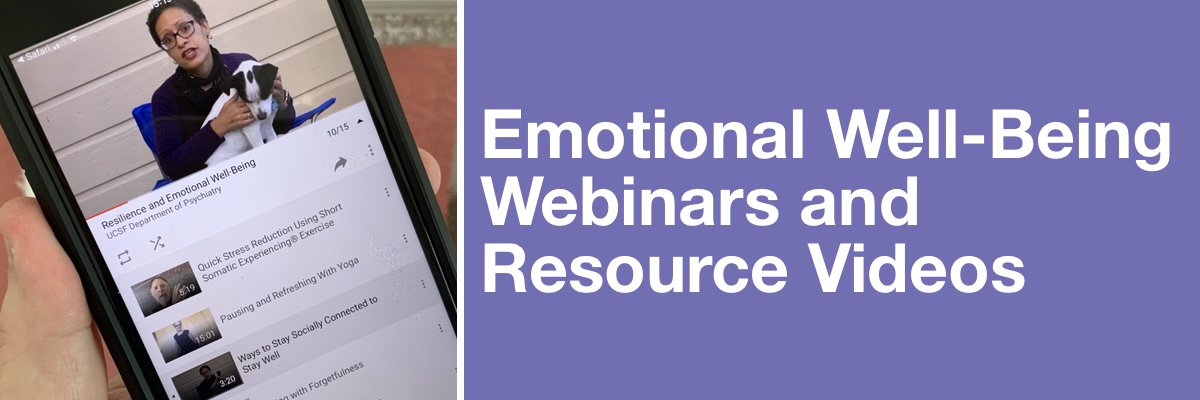UCSF is home to national leaders in medical education and education research, and the Department of Psychiatry and Behavioral Sciences is no exception. UCSF takes pride in supporting and fostering its clinician-educators, upholding the dual values of health care professionals and educators. To that end, several core faculty members of the department and the residency program are also members of the Haile T. Debas Academy of Medical Educators and graduates of the Teaching Scholars Program.
The mission statement of the UCSF Adult Psychiatry Residency Training Program includes:
- Fostering the development of psychiatrists who practice critical thinking and an evidence-based approach in all aspects of their work
- Maintaining scientific excellence and clinical relevance in the didactic program and the clinical training experiences of residents
The program seeks to provide broad exposure to a diversity of patients, modalities, therapies, and environments, while also emphasizing longitudinal relationships through communities of patients and teaching of fellow residents. To train future leaders in psychiatry, the didactic curriculum supports residents in their development of expertise in multiple domains of physicianship and psychiatric practice including in the roles of clinician, consultant, service innovator, team leader, educator, scholar, and specialist.
Didactics in the residency program are organized and taught with adult learning theory in mind, with consideration to cognitive load, psychological safety, clinical relevancy, just-in-time learning, inclusive and equitable learning environments, and resident feedback for continuous improvement.
Centralized didactics
Residents are provided with protected time from clinical responsibilities to attend centralized didactics on Wednesday afternoons, which at occur at least every other week for PGY-1 and PGY-2 residents and every week for PGY-3 and PGY-4 residents at the new UCSF Nancy Friend Pritzker Psychiatry Building near the Mission Bay campus. Several didactic weeks are held concurrently between classes to allow for near-peer teaching, mentorship, and collaboration.
Courses taught in the centralized didactics curriculum include:
PGY-1
- Acute Hospitalization
- Advocacy and Structural Competency
- Psychiatric Diagnosis
- Psychiatric Interview and Formulation
PGY-2
- Outpatient Intervention
- Clinical Neuropsychiatry
- Women’s Mental Health
- Interventional Psychiatry and Behavioral Circuits
- Neurodevelopment
- Psychedelic Psychiatry
PGY-3
- Child and Adolescent Psychiatry
- Geriatric Psychiatry
- Addiction Psychiatry
- Forensic Psychiatry
- LGBTQ+ Mental Health
- Integrated and Collaborative Care
- Cognitive Behavioral Therapy
- Psychodynamic Psychotherapy
- Clinical Psychopharmacology Seminar
- Advanced Neuroscience Seminar (Year 1 - Basic Science Focus)
PGY-4
- Senior Leadership Seminar
- Career Development Seminar
- History of Psychiatry
- Advanced Psychotherapy Course
- Advanced Psychopharmacology Seminar
- Advanced Neuroscience Seminar (Year 2 – Clinical Neuroscience Focus)
Site-based didactics
Additional protected time for didactics is provided with a just-in-time learning philosophy via site-based didactics that are taught in parallel and on-site with clinical rotations at Zuckerberg San Francisco General Hospital and Trauma Center, the San Francisco VA Medical Center, UCSF Langley Porter Psychiatric Hospital at Mount Zion, and the UCSF Helen Diller Medical Center at Parnassus Heights.
Courses taught in the site-based didactics curriculum include:
Acute Inpatient Psychiatry at ZSFG
- Acute Psychopharmacology
- Acute Psychiatry Case Conference
- Evidence-Based Medicine Seminar
Consultation-Liaison and Acute Inpatient Services at ZSFG and UCSF
- Intensive Services Didactics
- Acute Psychiatry Journal Club
Outpatient clinics at the San Francisco VA Medical Center
- Psychodynamic Formulation
- Group Therapies
Continuity and specialty clinics at the UCSF Pritzker Psychiatry Building
- Integrated Case Conference
- Quality Improvement Didactics
- Novel Therapeutics Journal Club
Grand Rounds and Residency Education series
The UCSF Department of Psychiatry and Behavioral Sciences Grand Rounds series seeks to promote excellence and quality in clinical care; introduce clinicians to recent advances in medical care; provide updates on scientific advances that affect the practice of medicine; and provide a forum for discussion of topics that strengthen the relationship of psychiatry to the broader community. Departmental grand rounds are held at 8:30 a.m. on Tuesdays in the Pritzker Building auditorium.
The Distinguished Visiting Lecturer Series (DVLS) is a group of special Grand Rounds talks given by preeminent subject matter experts in mental health and other related fields. These speakers are invited from around the nation and the world to share their experience and insight with UCSF faculty, staff, and trainees.
On Tuesday mornings that do not have department-wide Grand Rounds scheduled, the Adult Psychiatry Residency Training Program hosts residency-wide seminars that bring residents from different classes together in part to foster discussion and community building. Sessions have included:
- Financial planning for residents
- Applying to fellowships panel
- Academic careers panel
- Community/private practice careers panel
- Medical education/teaching skills workshops
- Risk assessment workshops







